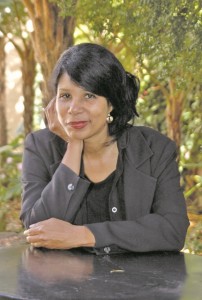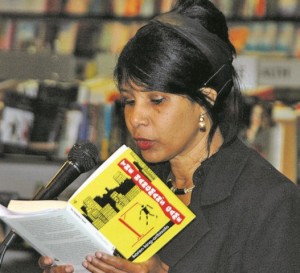Guyanese born Dr Karen King-Aribisala is a writer married to a Nigerian. She is a professor of English at University of Lagos, Nigeria. Two of her published works, “Our Wife and Other Stories”, and “The Hangman’s Game”- won the Commonwealth Writer’s Prize, Best First Book for African Region in 1991, and the Best Book Africa in 2008 respectively.
King-Aribisala is the daughter of the late Dr Kenneth and Joyce Miller King. Her father is the former minister of economic development, and Guyana’s ambassador to the European Union.

Her inspiration was her very influential father. He was instrumental in determining the course the writer’s life has now taken. At the age of eight, King-Aribisala first began writing creatively, and would read the stories she had written to him. Her father would comment on them and encourage her. As she grew up, her family migrated about the time of the Nigerian Civil War. They lived in Ibadan and she attended the International School, Ibadan. During the holidays her father would teach her particular parts of the Bible, particular books of poems by heart. They discussed poems together. All of these helped to encourage King-Aribisala to write.
The writer’s passion originated largely from growing up as an outsider in many of the places she lived in. Whether it is in Nigeria, the West Indies or Italy, where, as a teenager, she met her husband. She has always been an outsider: somebody who was not born in that particular place. This has led to her trying to understand the position of the outsider, whether it’s in terms of gender, religion, race, culture.
In explaining the aim of her writing, she stated: “…There are several messages. In “Our Wives” the title story deals with this African concept that when you are married into a family you become the wife of the family. Meeting somebody like me who has been trained in Western institutions, this is an appalling idea because it means that you lose your identity and you become swallowed up by a larger family. So, I tried to explore that in that story, and to show what I’ve said in other interviews, which is that to me, nation, race, culture, class are all dresses which we put on, in fact, out of pride. These dresses disguise the bare, core truth of humanity – things like pride, things like selfishness, which prevent us from occupying the extended family, if you like, to which we all belong. It’s okay to be individual, to say that you are a Nigerian, West Indian, or whatever. But often these are barriers which we use to fight against each other. And so, my position is that all of these barriers should be broken down. And that is actually one of the thrusts in my book ‘Kicking Tongues’.”
The author skilfully uses the vehicle of literature to examine the African West Indian, African American and African notions of slavery and imprisonment; to analyze the aspired nature of destination freedom. The conflicts expressed in her texts are essentially a clash between the material and spiritual worlds in the attainment of material or spiritual freedom. She believes it is a struggle in which all humanity is engaged.




